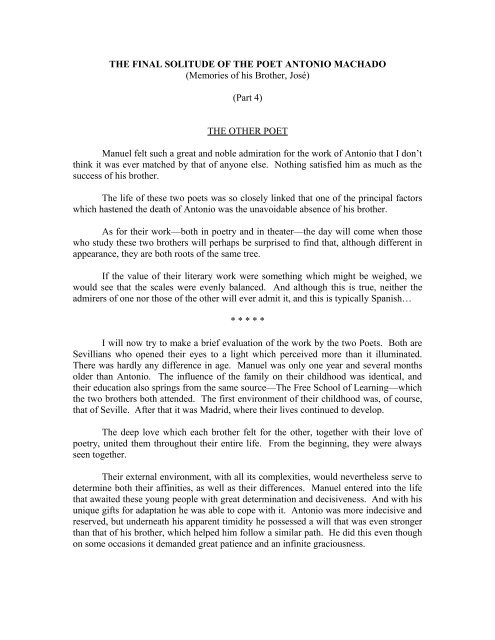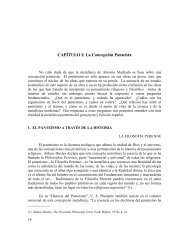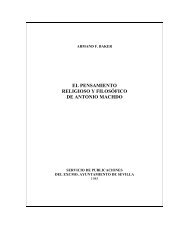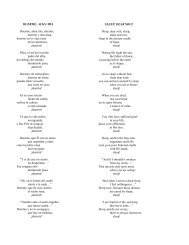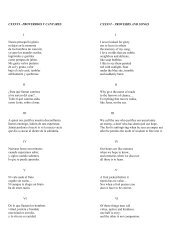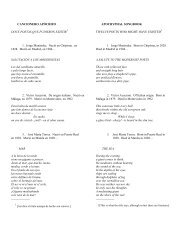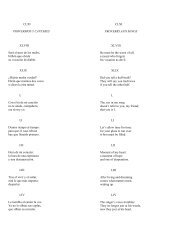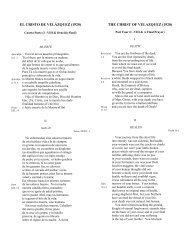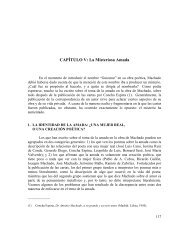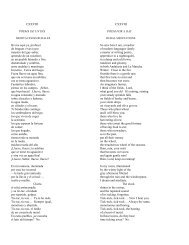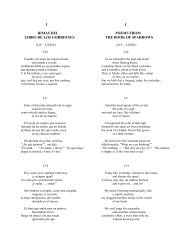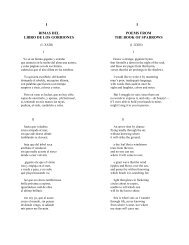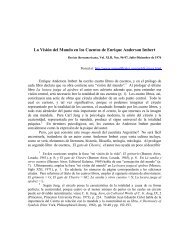Part 4 - Armand F. Baker
Part 4 - Armand F. Baker
Part 4 - Armand F. Baker
Create successful ePaper yourself
Turn your PDF publications into a flip-book with our unique Google optimized e-Paper software.
y a rush of events, and he always imposed on them the distinctive mark of his character.This was fortunate for him because, as he used to say, “poetry is one thing,” but the worldwe live in is something else.When his first book, Soul, was published, we were able to see the qualities whichwere most characteristic of him: “agility, grace, dexterity, and skill,” which he alsopossessed until the end of his life. Therefore, we were astonished to see him fall sosuddenly, making a grotesque jump with the agility typical of the Pierrot of whom hespeaks in his second book, Whimsy. Consider, for example, the refinement and theelegance of his miniatures like “Versailles,” which is one of a kind, and in which there issuch complete and utter understanding it would be difficult to equal, because the intuitionof the Poet—a true poet like this one—surpasses everything. Let us enjoy all this in hispoem, “Versailles”:I picked up a dry leafin the park,and I entered the Trianonwith it in my hand;the leafwas clothed in green.The King and Queen!,a thousand voices shouted;the echoes of the royal marchwere heard,and the halberds touched the floor.The King and Queen! Luis with his cortegeappeared on the threshold.Luis. Sun. King. His proudeyes cast their noble glanceon all his people:the valiant nobles,the gallant ladies,the intelligentand the elegant…Curly wigs…Cornucopias portrayexquisite figures;and the maidensand little princessesgossip of love,of love affairs,while they are surroundedby a throng of gallants,and amid silks, flounces and ruffles,colors and soundswirl and recede;discrete voicesquiet the sound duringthe calm hour of cameos.
and in the wake of my shipthere is only one thing: the sea.Then, speaking of his songs—Flamenco Songs (1912)—it is common knowledgethat they were so accepted by the public that they are indistinguishable from those of thefolk tradition. This shows the complete identification, as well as a total understanding ofthis popular genre. In this however, he is surpassed by Antonio who always retains hisown unmistakable personality. As for the greater success that Manuel seems to have hadwith his songs, this is perhaps because of his familiarity with the people, since his poemsseem to mirror them almost completely. If we now stop to consider the philosophicalsignificance of Manuel’s book, Soul, we will see that from the beginning what is mostimportant to him is to isolate the present moment from all that is happening. To preservethe instant that is passing and nothing more: not yesterday nor tomorrow: today.However, this ever-present concern (which is also present in the poems of Antonio) willproduce a sense of anguish disguised by a joviality and lightness which is more apparentthan real. There is no way to deny that, in his innermost self, this poet is sad and he feelsa sort of bitter skepticism because he knows that… But then, this is something he willtell us himself:Happiness…consists of having good healthand an empty noggin…Do you understand now—Mairena would have asked his students—why we greatmen are so sad?In order to conclude these brief remarks, we will take note of the fact that whenthe end of life was approaching, both poets seemed to remember the clear and pure lightof their childhood in Andalusia. But now, with eyes that are weary. During the last sadand cloudy days of February in Collioure (France) Antonio wrote this single line, the firstfrom a poem he could no longer finish:These sunny days and this sun of my childhoodAnd toward the end of his poetry we see that Manuel has a premonition of the sanitywhich, like Don Quijote, he will feel in the final hour. This is his state of mind when hewrites this haiku:Alas,I am nowno longerwho I was!After that will come the final line of his poetic work. It contains only six words. Andthey should be engraved in marble under his name as the definitive self-portrait ofManuel Machado. And these words are:angel, shadow, grace, the one who…
He passed by your door. He won’t come again.Finally, let us always remember that Antonio prefers to worship the Jesus whowalked on the sea, not the one who was nailed to the cross by the nails of a false piety:I can not, nor will I singto that Jesus on the cross,but to the one who walked on the sea!OTHER ASPECTSHis attitude toward politics is manifested very clearly throughout all his work.And it was expressed even more clearly when his admirable articles on internationalpolitics were published in “Mirador de la Guerra de la Vanguardia de Barcelona.”It is completely naïve, not to say self-serving, to try to define the Poet as a leftistas is done by some people, and it is even worse to say that he was a rightist, which hetotally rejected.One must always take into account that his true nature was morally incorruptible,and he never let himself be influenced by petty political interests.From the moment he began to reason he possessed a feeling of freedom that waseven greater than that of many who consider themselves more advanced. As fordogmatic and dictatorial sentiments, it would be stupid to waste even one drop of ink indiscussing these things which had absolutely no influence on him.Just as Antonio tried to follow the highest possible standard for his poetry and hasalways acted with the most authentic spiritual motives, he did the same with regard topolitics. (If we can even mention something which has become so discredited.)Of course it would appear that I am mistaken when I say that the Generation of 98(and in this case I am referring exclusively to the Poet) was not involved in politics.After all, he was precisely one of those who first turned against the politics of the periodwhich culminated in the loss of our Colonies (1898). Ever since then his poems havespoken out, foreshadowing a future struggle for freedom. In fact this attitude was alreadylatent in the depths of his soul and, when it resurfaced in 1936, it did nothing more thanrepeat the same ideas. Therefore, without any hesitation he gladly took the part of thepeople from the beginning. But let’s be clear about this; it is the people themselves whohave approached the ideals of the Poet, which are superior to their own. Naturally,whenever misfortune has made a victory impossible, he feels an indescribable sorrow thatthings have not turned out as they ought to.But while we have spoken of his true and sincere support for the people, we mustsay, nevertheless, that it would be wrong to think that he ever expressed his unconditionalagreement with a particular group. This is because Antonio is essentially unclassifiable,
or one of a kind. That is why in poetry, as well as in religion and politics, he always triedto reach the highest possible level of what is ideal. In a word, he tried to lift things up,while others only lowered them.And now I will go on to include a few interesting anecdotes about the Poet. Butbefore I do that I want to write a few words in support of this new element I am includingwhich, in my opinion, has great importance.PRAISE FOR THE VALUE OF SOME ANECDOTESIt is true that as a rule the anecdotal part of an author’s life is less interesting andmore trivial. But it is also true that when it concerns something in which we are directlyinvolved that changes things completely.And in this respect an anecdote comes to mind that helps to support that preciseobservation.The anecdote which I am going to recount is about Pope Leo XIII who occupiedthe Holy Office during the past century. It is said that on one occasion a Cardinal, whosename I don’t remember, approached His Holiness with the greatest respect and whisperedthese words quietly in his ear: “Holy Father, don’t you think these medallions we aregiving with such profusion to the pilgrims who come to enjoy your presence are nothingmore than cheap trinkets?” To which Leo XIII responded without the slightest hesitation:“But they are given by the Pope.” I can’t even begin to imagine what the Cardinal wasable to reply in response to this shrewd remark.With that in mind, although some may feel that the following anecdotes aretrivial, and even though they seem that way, they actually help to give a more completeunderstanding of the essential nature of Antonio’s character.I am going to try to remember the time when he was getting ready to apply for theposition as Teacher of French in the Institutes of the provinces. It was in 1907 when hewas finally ready to enter the profession. He picked Soria for reasons that we havealready mentioned in an earlier section.It is obvious that this choice was of capital importance in the life of Antonio.Because it was there in those fields of Castile where he met Leonor, his one and onlylove. It was there that he met the being who had the greatest harmony with the landscapewhich was already imprinted in the depths of his soul.During the time that passed while he was preparing to apply for this position, hespent hours and hours working. Nevertheless, with great kindness to me, he agreed to bea model for the painting I was then preparing for the Fine Arts Exposition. The reason Iam mentioning this is because he is the principal figure in “The Game of Chess” which isdepicted in this painting.
It was getting late and we were about to take our usual walk after which we wouldgo to a café where we would stay until supper time.This was the time when a very serious, hard-working and intelligent professor hadarrived from the University of Seville to fill a new position at the University of Madrid.Antonio, who was always ready to learn something new, thought it would be a good ideaif we took his course at the university. And so we did. It was a thought-provokingcourse which was presented with great clarity, making the material very interesting.Our mother, who happened to be a good friend of the professor’s wife, constantlyurged us to attend her Wednesday evening gatherings when she invited some friends andstudents to tea. Antonio struggled with the desire to satisfy his mother’s wishes and hisvery strong urge to avoid these gatherings. And so I remember that he almost alwaysurged me to accompany him to help him bear up under the strain, telling me, as ithappened on more than one occasion:Tonight, Don Pepe!Make up your mind, José!go with me to the houseof Talés y Fertéwhich is the name he gave to this professor. Of course I was always happy to go withhim. But without remembering his frequent tendency to get lost in his thoughts.One of these nights when she was receiving visitors this good lady, who used tochatter incessantly, was making use—or better, was misusing—these oratorical abilities.At one moment, turning angrily to Antonio she blurted out: “Look here, Don Antonio,this last maid I had not only stole my coffee teaspoons, but today she broke all of my finechina. What do you think about that!... “Ah, madam, good…Very good! Wonderful!”The rest of us sat there like stones.Once again we have to mention this tendency, since it was so frequent in him, tobe totally absent from his immediate reality when his personal thoughts occupied him socompletely. It was these moments of absentmindedness that sometimes produced someminor conflicts.For example, one Sunday afternoon while he was visiting the house of a languageprofessor, as he often did he was absentmindedly making little balls with some papersthat were under his hands. While he was deeply involved in conversation, the nephew ofthe professor—who was called Don Langostín—came into the room with his wife. Bothwere all dressed up, preparing to go out. They had come to find their theater ticketswhich they had forgotten on their uncle’s table. They looked everywhere but couldn’tfind them anywhere. But how were they going to find them if the Poet, while lost inconversation with the learned professor, had made them into little balls! There is no wayto describe the expression of Don Langostín. And that of the lady… even less. It wassimply indescribable.
It was pointless to think that he might stop being so absent-minded and distractedafter seeing him go to such incredible extremes. He himself spoke of the time when hehad two girl friends on the same street, because he was unable to remember that healready had one there. Once when he was speaking with the second, he suddenlyremembered the first. Then, to avoid conflicts, he decided to leave by the other end ofthe street, leaving both girl friends behind. And after that, just in case, he never set footon that street again. And what is more, this doesn’t seem to be in agreement with what hewrote in his Portrait:I am not a seducing Don Juan nor a Bradomin…But these contradictions are typical of all great men. Besides, at that time he hadstill not written that line, nor the following either:you already know the shabby state of my clothessince that was the time when he was aspiring to be an actor and he always dressed inwhite colors, which was customary in the actor’s guild.* * * * *As was our custom, every afternoon we went for a walk in order to get out of thecity. The hike was usually a long one and afterward we almost always ended up in a caféwhere we would meet our brother, Manuel, thus forming a group of the three brothers,which was a custom that lasted until the beginning of the war.After one of these afternoon hikes which had been long and strenuous, a youngwoman who recited poetry marched into the café. She was an extremely attractivewoman who was very expressive. With his usual kindness and courtesy, Antonio askedabout her travels and her professional accomplishments. Of course, she eagerly told himof her successes, and especially the time when she did a recitation next to Niagara Falls.Antonio leaned back in his seat and exclaimed: “So it was next to…?” “Niagara Falls,”the undaunted reciter repeated forcefully. She left after that, saying that the next day shewould come back and bring him an invitation to her coming recitals. She had hardlygone through the door when the Poet said: “That’s the last time we’re coming to this café.You understand, if she gets hold of us again, we’ll never get away.”So that is what we did.* * * * *Table of Contents:http://armandfbaker.com/biography_toc.html


